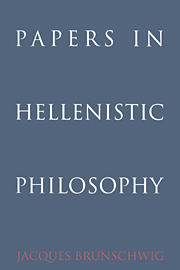1 - Epicurus' argument on the immutability of the all
Published online by Cambridge University Press: 25 October 2009
Summary
The few lines in the Letter to Herodotus (39.4–8) that I propose to study here have often been discussed by editors and translators of Epicurus. As early as 1920, Ettore Bignone, in his translation of the fragments, devoted a three-page appendix to this passage, which he described as ‘ very difficult’. More recently, these lines have constituted one of the – in truth, numerous – points over which Jean Bollack, who has proposed a new interpretation of the text, has been strongly criticized, in particular by Pierre Boyancé and Olivier Bloch. One of my own reasons for returning to this controversial passage is that I believe I can suggest for the problem that it poses a solution which I (of course) consider satisfactory. Another is that, by closely linking our analysis of the text with an analysis of the discussions to which it has already given rise, we shall raise questions to do with methodology and, more generally, hermeneutics, the interest of which may even eclipse that of their pretext – questions which are, perhaps, not unconnected with the preoccupations of Joseph Moreau, the Greek scholar and philosopher in whose honour these pages are written.
Our text comes at the beginning of the Letter to Herodotus. It follows on immediately after the statement and demonstration of the first two fundamental physical theses: nothing is born from the non-existent and nothing is lost in it.
- Type
- Chapter
- Information
- Papers in Hellenistic Philosophy , pp. 1 - 20Publisher: Cambridge University PressPrint publication year: 1994



